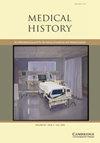‘The god of criminals is their belly’: diet, prisoner health, and prison medical officers in mid-nineteenth-century English and Irish prisons
IF 1.1
2区 哲学
Q4 HEALTH CARE SCIENCES & SERVICES
引用次数: 0
Abstract
Existing scholarship on prison diets has emphasised the role of food and its restriction as a key aspect of the deterrent system of prison discipline introduced in the 1860s. Here we suggest that a strong emphasis was placed on dietary regulation after the establishment of the reformist, but also ‘testing’, separate system of confinement in the mid-nineteenth century. While the impact of diet on the physical health of prisoners was a major concern, we argue that the psychological impact of food was also stressed, and some prison administrators and doctors argued that diet had an important protective function in preserving inmates’ mental wellbeing. Drawing on a wide range of prison archives and official reports, this article explores the crucial role of prison medical officers in England and Ireland in implementing prison dietaries. It highlights the importance and high level of individual adaptations to dietary scales laid down centrally, as a means of utilising diet as a tool of discipline or as an intervention to improve prisoners’ health. It examines the forays of some prison doctors into dietary experiments, as they investigated the impact of different dietaries or made more quotidian adjustments to food intake, based on local conditions and food supplies. The article concludes that, despite central policies geared to establishing uniformity and interest in new scientific discourses on nutrition, a wide range of practices were pursued in individual prisons, mostly shaped by practical rather than scientific factors, with many prison medical officers asserting their autonomy in making dietary adjustments.罪犯之神是他们的肚子":十九世纪中期英国和爱尔兰监狱中的饮食、囚犯健康和监狱医务人员
有关监狱饮食的现有学术研究强调了食物及其限制作为 19 世纪 60 年代引入的监狱纪律威慑系统的一个重要方面的作用。在此,我们认为,在十九世纪中叶改革派建立了单独监禁制度,但同时也是 "测试 "制度之后,对饮食的管理受到了极大的重视。虽然饮食对囚犯身体健康的影响是一个主要问题,但我们认为,食物对心理的影响也受到重视,一些监狱管理者和医生认为,饮食对维护囚犯的精神健康具有重要的保护作用。本文利用大量监狱档案和官方报告,探讨了英格兰和爱尔兰的监狱医务人员在实施监狱食谱方面的关键作用。文章强调了个人对中央规定的饮食标准进行调整的重要性和高度适应性,将饮食作为一种惩戒工具或改善囚犯健康的干预手段。文章探讨了一些狱医在饮食实验中的尝试,他们调查了不同饮食方案的影响,或根据当地条件和食物供应情况对食物摄入量进行了更为日常化的调整。文章的结论是,尽管中央政策旨在建立统一性,并对新的营养科学论述感兴趣,但各个监狱还是采取了各种各样的做法,这些做法大多是由实际因素而非科学因素决定的,许多监狱医务人员在调整饮食方面坚持自己的自主权。
本文章由计算机程序翻译,如有差异,请以英文原文为准。
求助全文
约1分钟内获得全文
求助全文
来源期刊

Medical History
医学-科学史与科学哲学
CiteScore
1.60
自引率
0.00%
发文量
25
审稿时长
>12 weeks
期刊介绍:
Medical History is a refereed journal devoted to all aspects of the history of medicine and health, with the goal of broadening and deepening the understanding of the field, in the widest sense, by historical studies of the highest quality. It is also the journal of the European Association for the History of Medicine and Health. The membership of the Editorial Board, which includes senior members of the EAHMH, reflects the commitment to the finest international standards in refereeing of submitted papers and the reviewing of books. The journal publishes in English, but welcomes submissions from scholars for whom English is not a first language; language and copy-editing assistance will be provided wherever possible.
 求助内容:
求助内容: 应助结果提醒方式:
应助结果提醒方式:


